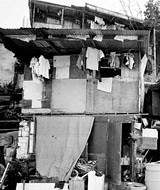Camp 7 & the Platinum Captives

[Image: Guantánamo Bay Detention Camp.]
Apparently, this was quietly alluded to last December in the New York Times tucked under the wordy little girth of an article I think I remember reading -- but somehow left me less curious than I should have been about the existence of what has now been confirmed at Guantánamo as “Camp 7.”
The first clue via the NYT:
The notes that were declassified from Mr. Khan’s lawyers, Gitanjali S. Gutierrez and J. Wells Dixon, say he “lives in Camp 7” and imply that he has contact with at least one other high-value detainee, Abu Zubaydah.
Officials at Guantánamo have not discussed the existence of a Camp 7. They often say publicly that the most recent center constructed there is Camp 6, a modern maximum-security building.
Real quick, in case you haven’t been following along (and I am really just catching up myself), Majid Khan (a former resident of Baltimore) is a detainee at Camp 7 and purported to be a co-conspirator with Khalid Shaikh Mohammed, who, according to the Pentagon, is “the mastermind of the Sept. 11 attacks”, and had selected Khan at some point “to study the feasibility of blowing up gasoline stations and poisoning reservoirs in the United States.”

[Image: "Photographs of a restraint board reportedly for waterboarding used by the Khmer Rouge in Cambodia in the 1970s, currently in the Tuol Sleng museum of Khmer Rouge crimes in Phnom Penh." - via.]
In a recent article by The Miami Herald the CIA confirmed that Khalid Shaikh Mohammed (or “KSM”), was “covertly waterboarded somewhere overseas to break his will” (read more about waterboarding here), and that following this interrogation and having been brought to Camp 7, he has since confessed “to plotting a virtual, global campaign of terror -- everything from the Sept. 11 assaults on New York and the Pentagon to the never-realized assassinations of American presidents.”
Regardless of your stance on (un)lawful interrogation techniques, torture, or even Gitmo for that matter, you still have to question the validity of confessions suddenly prompted in the context of waterboarding, a controversial tactic widely seen as torture, and now any confessions or evidence induced by good old Camp 7, yet another little distortion of secret space enfolded in the liminal landscape of the War on Terror.

Nevertheless, should we really be surprised about the existence of a new “top-secret” Gitmo camp, whose location remains unclassified, and still -- for all legal intents and purposes -- doesn’t even really exist, aside from the fact now that some Gitmo commanders say it does? Of course not. The real question is: what others just like it also exist, where, and for what purposes? And how should they be legally addressed?
In an interview with The Associated Press printed just a couple days ago, Rear Adm. Mark Buzby -- the top commander of detention operations at Guantánamo -- described Camp 7 as a “maximum-security lockup” for 15 key alleged al-Qaeda members; a facility, according to the report, “that was already built when President Bush announced in September 2006 that 14 high-value terrorism suspects had been transferred from CIA secret detention facilities to Guantánamo. An additional detainee, Abd al-Hadi al-Iraqi, arrived last April.”
The AP goes on to tell us that so far “detainees have been held in Camp Echo and Camps 1, 2, 3, 4, 5 and 6,” where journalists have been allowed media tours for the most part. Camp 7, however, is supposedly a way to isolate these senior al Qaeda captives called ''high-value detainees,” from the other 262 detainees at Gitmo, that is, according to The Miami Herald, “run by a special unit code-named Task Force Platinum.” But, even though we are to believe that Camp 7 is the necessity of preventing Guantánamo detainees from finding ways of communicating with each other, and to prevent retribution amongst one another, and even to protect itself from a future terrorist attack by limiting public knowledge about the locations of some of these places, the more glaring reason for Camp 7 in my eyes seems to be to simply cover up and shield whatever activities are actually taking place there, and as merely more practice in black world secrecy -- expanding the "classified" infrastructures of nowhere.

Kahn told a military panel he was subjected here to such intense CIA interrogation tactics in the first months, “that he gnawed at the artery in his arm, wanting to die.”
From what I’ve read, aside from Gitmo’s top brass, only the Red Cross has actually seen this secret prison camp, while Kahn’s lawyers Wells Dixon and Gita Gutierrez, from the New York Center for Constitutional Rights, perhaps also have seen Camp 7, or maybe just Kahn himself (I’m not clear), one of the only captives of Camp 7 to have been communicated with by outsiders.
But The Miami Herald goes on to ask some crucial questions:
Who runs this camp? Who built it? How does it function? Who comes and goes and gets to talk the detainees? When and how will they see lawyers?
And I will add, how long will they stay there, what kind of legal scrutiny should it be exposed to, what goes on at this camp in terms of interrogation exactly, what exists in the realm of interrogation oversight; how is Camp 7 “legal”? What mechanisms constitute the right for Camp 7 to exist, or does it merely exist outside of the law, much like Guantánamo itself? Meaning, is it neither legal nor illegal, but sub-legal, or extra-legal? Which is fascinating to think of about actually; life being neither of these, but just merely existing devoid of legal value; legal value itself as both an ideal and a harrowing human prospect.

<[Image: Guantánamo Bay Detention.]
Reminds me of this Agamben quote I spotted on Angela’s blog:
One day humanity will play with law just a children play with disused objects, not in order to restore them to their canonical use but to free them from it for good. What is found after the law is not a more proper and original use value that precedes the law but a new use that is born only after it. And use, which has been contaminated by law, must also be freed from its own value. This liberation is the task of study, or of play. And this studious play is the passage that allows us to arrive at that justice that one of Benjamin’s posthumous fragments defines as a state of the world in which the world appears as a good that absolutely cannot be appropriated or made juridical.
Anyway, I will certainly offer more as I come across it, but -- what has been the Pentagon's reaction to all of this? When asked to comment on story this morning, Pentagon spokesman Bryan Whitman said only: "Some aspects of Guantánamo Bay are more transparent than others."
Don't forget: An Exceptional Paradise; Guantánamo and the Border Exodus; Justice Barred; A Camp Called Justice; A Mini-city for Trying Terror; Gitmo Courthouse Compound goes bye bye; Walkthrough Gitmo: the de-restricted fortress







<< Home